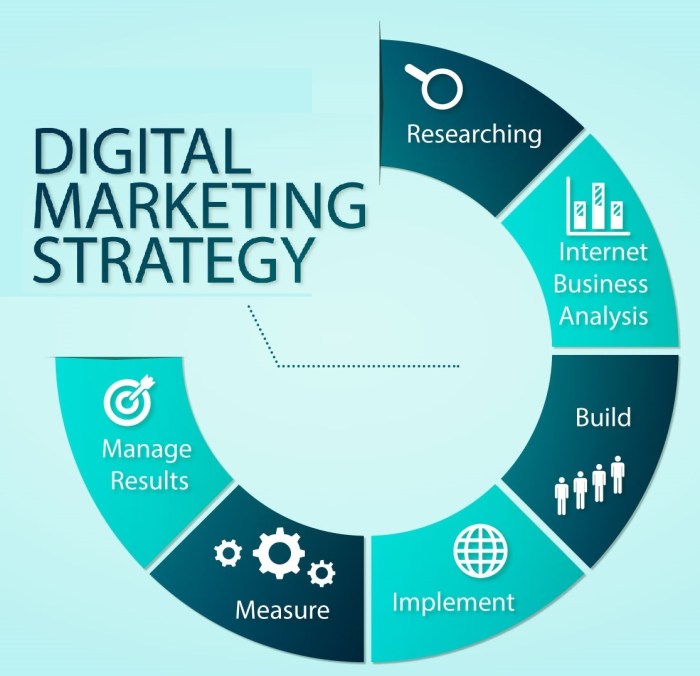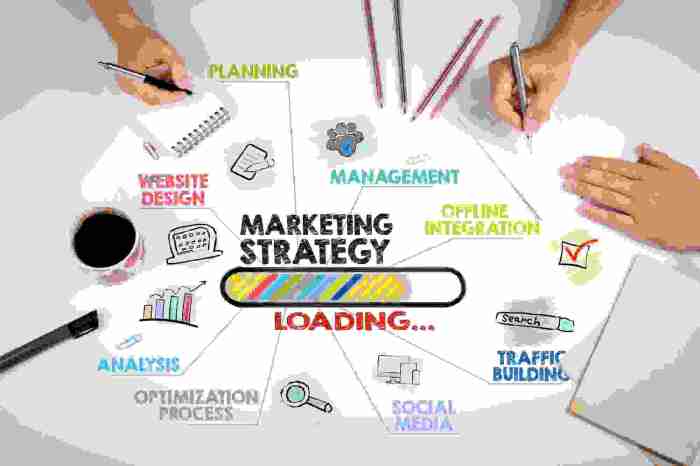Digital Marketing Strategy is like the ultimate playbook for online success, where , social media, and content marketing come together in a symphony of clicks and conversions. Get ready to dive into the digital world where strategy reigns supreme!
Overview of Digital Marketing Strategy

A digital marketing strategy refers to a plan of action designed to achieve specific marketing goals through online channels and platforms. It involves utilizing digital technologies to reach and engage with target audiences, ultimately driving conversion and increasing brand awareness.
Importance of Having a Digital Marketing Strategy
Having a digital marketing strategy is crucial for businesses in the digital age as it allows them to effectively reach their target audience, increase brand visibility, and maximize their ROI. Without a clear strategy in place, businesses may struggle to compete in the crowded digital landscape and fail to achieve their marketing objectives.
- Allows for targeted marketing efforts: By defining specific target audiences and creating tailored content, businesses can reach the right people with the right message, increasing the likelihood of conversion.
- Measurable results: Digital marketing strategies enable businesses to track and measure the performance of their campaigns in real-time, allowing for adjustments to be made to optimize results.
- Enhances brand reputation: Consistent and engaging digital marketing efforts can help build brand credibility and trust among consumers, leading to long-term customer loyalty.
Examples of Successful Digital Marketing Strategies
Red Bull’s Content Marketing Strategy: Red Bull has successfully utilized content marketing to create a lifestyle brand around extreme sports and adventure. Their high-quality videos and social media campaigns have resonated with their target audience, leading to increased brand awareness and loyalty.
Amazon’s Personalized Recommendations: Amazon’s use of personalized recommendations based on user behavior and preferences has significantly contributed to their success. By tailoring product suggestions to individual customers, Amazon has been able to increase sales and customer satisfaction.
Dollar Shave Club’s Viral Video Campaign: Dollar Shave Club’s viral video campaign, “Our Blades Are F*ing Great,” helped the company gain widespread attention and a loyal customer base. The humorous and relatable video resonated with consumers, showcasing the power of engaging content in digital marketing.
Components of a Digital Marketing Strategy

In the world of digital marketing, there are several key components that work together to create a successful strategy. These components include , social media, content marketing, email marketing, and more. Each of these elements plays a crucial role in reaching and engaging with your target audience, driving traffic to your website, and ultimately converting leads into customers.
(Search Engine Optimization)
Search Engine Optimization, or , is the process of optimizing your website to rank higher in search engine results pages. By incorporating relevant s, creating quality content, and building backlinks, you can increase your website’s visibility and attract more organic traffic. For example, by optimizing your website for specific s related to your business, you can improve your chances of appearing on the first page of search results when potential customers are looking for products or services like yours.
Social Media Marketing
Social media is a powerful tool for reaching and engaging with your target audience. Platforms like Facebook, Instagram, Twitter, and LinkedIn allow you to connect with potential customers, share valuable content, and build relationships that can lead to conversions. For instance, by creating engaging posts, running targeted ad campaigns, and interacting with followers, you can increase brand awareness and drive traffic to your website.
Content Marketing
Content marketing involves creating and sharing valuable, relevant content to attract and engage your target audience. This can include blog posts, videos, infographics, and more. By providing informative and entertaining content, you can establish your brand as an authority in your industry and build trust with potential customers. For example, by publishing regular blog posts that address common pain points or offer solutions to your audience’s problems, you can position your brand as a helpful resource and attract more leads.
Email Marketing
Email marketing is a powerful tool for nurturing leads and converting them into customers. By creating personalized email campaigns, you can deliver targeted messages to your audience, promote your products or services, and drive conversions. For instance, by sending out weekly newsletters with exclusive offers, product updates, and helpful tips, you can keep your audience engaged and encourage them to take action.
These components of a digital marketing strategy work together to create a cohesive and effective approach to reaching and engaging with your target audience. By incorporating , social media, content marketing, and email marketing into your overall strategy, you can attract more traffic to your website, generate leads, and ultimately drive sales for your business.
Developing a Digital Marketing Strategy
Creating a digital marketing strategy involves several key steps that are essential for its success. From setting goals and objectives to identifying the target audience and selecting the right channels, each step plays a crucial role in shaping an effective strategy.
Setting Goals and Objectives
- Define clear and specific goals that align with your overall business objectives.
- Set measurable key performance indicators (KPIs) to track the success of your digital marketing efforts.
- Establish realistic timelines for achieving your goals to stay on track and measure progress effectively.
- Ensure that your goals are attainable and relevant to your target audience to drive meaningful results.
Identifying Target Audience and Choosing the Right Channels
- Conduct market research to understand the demographics, behaviors, and preferences of your target audience.
- Create buyer personas to represent different segments of your target audience and tailor your messaging accordingly.
- Select the most appropriate digital marketing channels based on where your target audience spends their time online.
- Consider factors such as social media platforms, search engines, email marketing, and content marketing to reach your target audience effectively.
Implementing and Executing a Digital Marketing Strategy
To effectively implement and execute a digital marketing strategy, it is essential to focus on the chosen components and ensure they are seamlessly integrated into the overall plan. Monitoring and measuring the success of the strategy is crucial to make necessary adjustments and optimize results. Flexibility and adaptation play a key role in responding to changing market conditions and consumer behavior.
Effective Implementation of Chosen Components
Implementing the chosen components of a digital marketing strategy involves aligning them with the overall goals and objectives of the campaign. It is important to ensure that each component complements the others and works together cohesively. Regular communication and collaboration among team members are essential to ensure a smooth implementation process.
Tips for Monitoring and Measuring Success
- Utilize web analytics tools to track key performance indicators (KPIs) and measure the effectiveness of each component.
- Set specific and measurable goals to gauge the success of the strategy and make data-driven decisions based on the results.
- Regularly review and analyze the data to identify trends, strengths, and areas for improvement.
- Implement A/B testing to compare different strategies and determine the most effective approach.
Importance of Flexibility and Adaptation
Flexibility and adaptation are crucial in the execution of a digital marketing strategy to respond to changing market dynamics and consumer preferences. By staying agile and open to adjustments, businesses can optimize their strategies and stay ahead of the competition. Being willing to experiment with new ideas and pivot when necessary can lead to increased success in the long run.
Tools and Technologies for Digital Marketing Strategy
When it comes to executing a successful digital marketing strategy, having the right tools and technologies at your disposal is crucial. These tools can help streamline processes, track performance, and ultimately improve the overall effectiveness of your strategy.
Essential Tools for Digital Marketing
- Google Analytics: Provides valuable insights into website traffic and user behavior, helping to optimize campaigns and improve ROI.
- Hootsuite: A social media management platform that allows for scheduling posts, monitoring engagement, and analyzing performance across multiple channels.
- SEMrush: An all-in-one tool for research, competitor analysis, and tracking website rankings.
- Email Marketing Software: Platforms like Mailchimp or Constant Contact help manage email campaigns, segment audiences, and track results.
How Tools Improve Strategy Implementation
By using these tools, marketers can make data-driven decisions, automate repetitive tasks, and gain a comprehensive view of their digital marketing efforts. This leads to more efficient campaigns, better targeting, and ultimately, increased success in achieving marketing goals.
Emerging Technologies in Digital Marketing, Digital Marketing Strategy
- Artificial Intelligence (AI): AI-powered tools can analyze data, personalize content, and automate processes, enhancing the customer experience and driving conversions.
- Chatbots: Chatbots provide instant customer support, engage users in real-time, and collect valuable data for personalized marketing campaigns.
- Voice Search Optimization: With the rise of smart speakers and voice assistants, optimizing content for voice search is becoming increasingly important for digital marketers.
Measuring ROI and Performance of a Digital Marketing Strategy
In the world of digital marketing, it’s crucial to measure the Return on Investment (ROI) and performance of your strategies to ensure success and optimize your efforts. Tracking key metrics, analyzing data, and making data-driven decisions are essential components of this process. Let’s dive into how you can effectively measure and improve the performance of your digital marketing strategy.
Key Metrics to Track for Measuring Success
- Conversion Rate: Measure the percentage of website visitors who take a desired action, such as making a purchase or filling out a form.
- Click-Through Rate (CTR): Track the percentage of people who click on a specific link out of the total number of people who see it.
- Cost per Acquisition (CPA): Determine how much it costs to acquire a new customer through your marketing efforts.
- ROI: Calculate the return on investment by comparing the revenue generated from your marketing campaigns to the cost of running those campaigns.
Analyzing Data and Making Data-Driven Decisions
Once you have collected data on key metrics, it’s important to analyze this data to gain insights into the performance of your digital marketing strategy. By leveraging tools like Google Analytics, you can track user behavior, identify trends, and make informed decisions to optimize your campaigns. Use A/B testing to experiment with different strategies and determine what works best for your target audience.
Optimizing Strategies Based on Performance Data
- Identify High-Performing Channels: Analyze which marketing channels are driving the most traffic and conversions, and allocate more resources to those channels.
- Adjust Campaigns in Real-Time: Monitor the performance of your campaigns regularly and make adjustments based on the data to improve results.
- Personalize Your Marketing Efforts: Use data insights to create more targeted and personalized campaigns that resonate with your audience.
- Implement Retargeting Strategies: Reach out to users who have previously interacted with your brand but did not convert, increasing the chances of conversion.
